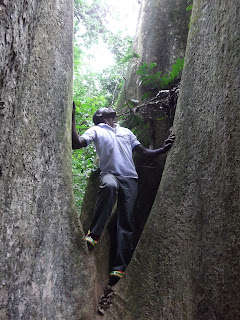On Friday I visited the Accra
office of the Commonwealth Human Rights Initiative. This is an
independent, international NGO which aims to “ensure the practical realisation
of human rights in Commonwealth countries” by promoting awareness of and adherence
to human rights principles. Its work includes research, advocacy,
networking, public education programmes, providing legal advice, and
facilitating legal representation.
The Accra office is currently
focused on two main areas: Access to Justice and the Right to Information
campaign. This latter is a project aimed at shaping and securing the
passage of a Right to Information Bill. I looked at various booklets that
CHRI had produced on the matter and was interested to see the frequent use of
comparisons from other Commonwealth countries, such as the Sri Lankan Freedom
of Information Bill, the South African Open Democracy Campaign Group,
and Parivartan, the Indian Express Right to Know Campaign. It was another reminder of how useful the
Commonwealth can be in providing examples and precedents for countries which share the common law system.
The Access to Justice project is aimed at making people
aware of their rights and in defending against infringement of those
rights. The principal focus is on
prisoners: every week CHRI visits police stations in Accra and Kumasi to speak
with prisoners in custody there and to assist those who may be being improperly
treated. Paralegals at CHRI will take a
statement from an inmate who complains of abuse, question the police, and then
make follow-up calls and visits to ensure that the situation is rectified. Between March and June 2012, 233 detainees’
cases were received by CHRI. The types
of “irregularities” observed include beatings, unlawful arrest, the mixing of
young prisoners with adults, and unlawfully withholding bail.
I was shocked to discover the extent to which this last
occurs. Prisoners are not supposed to be
detained for longer than 48 hours, but an intern at CHRI told me that of the
prisoners to whom she spoke on a recent visit, the inmate who had been there
the shortest period had been incarcerated
for 6 months. I was told of another case
of someone who been in prison awaiting trial for 14 years.
Unfortunately, CHRI does not have the funding to employ
lawyers: the Access to Justice team is made up of paralegals and interns. CHRI is only able to take on cases to court
if a lawyer can be found who is willing to act on a pro bono basis – and not
many are.
My visit to CHRI helped clarify something which had been
puzzling me. I think I have mentioned before
on this blog that criminal cases make up a relatively small proportion of the
overall caseload here, in contrast to the UK where it is a major part of the
courts’ work. It seems that – as with
other areas of law - many matters are settled within communities or
alternatively, the suspect will be released if he makes amends
immediately. Apparently, only the more
serious offences such as murder, robbery, defilement, and rape, will go to
court.
I spent the afternoon at Sam Okudzeto & Associates,
finishing off a research project and attending the office meeting. As mentioned previously, at each meeting an
update is given on all the cases that have been in court that week. I was struck – once again – by the delay endemic to the Ghanaian legal system. Fifteen cases were discussed. Of these, all but four were adjourned. In three, the judge was ill; in another
three, the other side didn’t turn up; in yet another three, the other side’s
lawyer didn’t turn up; in one, the witness didn’t attend; and in the last case,
an administrative error meant that the application had to be withdrawn. This is clearly very far from being a
scientific survey, but nevertheless it is telling. I have discussed elsewhere the positive
aspects of a slightly more relaxed attitude to and in court, but these levels
of absenteeism surely illustrate the disadvantages.










